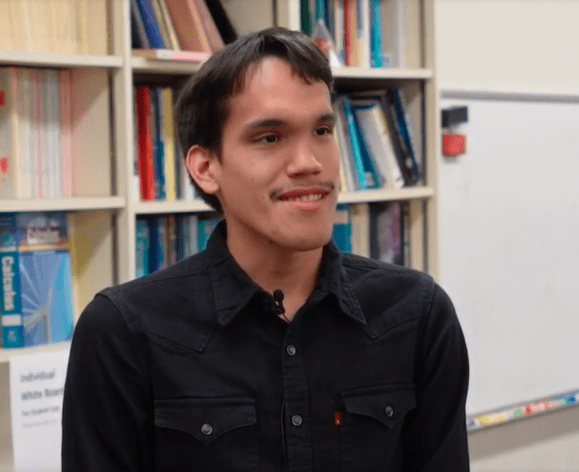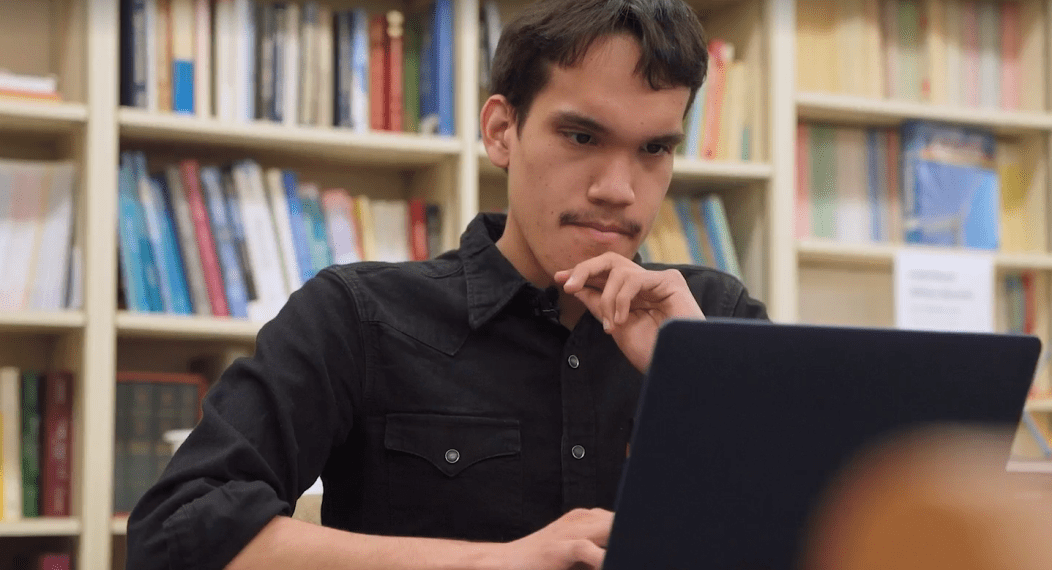
Major: Mathematics
Graduation year: 2025
Hometown: Stockton, California
Internship: Chan-Zuckerberg Biohub
Activities: Community Involvement Program (CIP), Pacific Math Club, Pi-Mu Epsilon Math Honors Society, MathHub tutor
Oscar Avalos has always enjoyed numbers and puzzles. He came to Pacific with a desire to study pure mathematics, but an invitation from his professor to attend a math conference led him to a prestigious internship at the Chan-Zuckerberg Biohub, where he discovered his passion for biomathematics.
Why did you choose to study mathematics?
When I was in high school, I became really interested in math. I originally wanted to be an engineer, but I’ve always liked numbers and I’ve always been curious about learning more about their significance in pure mathematics and the mathematical sciences. Even when I was a young child, I always liked card games, puzzles and board games. And now as a math major, I like them even more and I am sure that mathematics was the right field of study for me.
Tell us about your summer fellowship at the Chan-Zuckerberg Biohub.
The Biohub is a research organization based in San Francisco. Their main objective is to end all diseases by the end of the 21st century. I had the opportunity to work with the Theory Group, which focuses more on the biophysics side. We used mathematical modeling and derived equations related to our models, and I worked on polyribosomes, or polysomes. In order to model them, we used molecular dynamics simulations, which are computer simulations that we used to model the movements of molecules and atoms. In our case, the curvature, fluctuations, and configurations of bound polysomes to their hairpin and spiral-like shapes.
It was a wonderful experience. Going into this internship, I knew it was going to be very challenging and exciting, but it also changed my mindset in terms of the career that I want to pursue . When I started college at Pacific, I wanted to be a pure mathematician. Nothing related to the applications of mathematics or anything else, just math, math, math. But now I’ve become very interested in biomathematics and mathematical biophysics. Mathematics can be used in biology in various ways, like studying the spread of diseases, epidemics and pandemics, and cellular dynamics and structures.
How did you find this opportunity?
Well, it’s a funny story. It starts back in late February of 2022, which is late if you want to apply for an internship or fellowship. Dr. Goff, who used to be a mathematics professor—he's now the director of general education—invited all of the math majors to a math conference, the MAA Golden Section Math Conference. He gave us all the opportunity to come along, and the math department would pay for our registration.
I was just there, having lunch, when I had a casual run-in with the man who became my research adviser at the Biohub. We started talking about mathematics and physics and he was very interested in me as a student. We had a conversation, he gave me his business card, and that was the end of that.
But two weeks later, in March, during spring break, he had someone from his company contact me about an internship. I submitted my resume, got to meet the Theory Group, they were interested in me, and there I was: spending my summer in San Francisco as an intern at the Biohub. I am very thankful for the guidance of research advisors from the Theory Group: Greg Huber (the leader), Guillaume Le Treut, and David Yllanes.
You’re also involved on campus as a math tutor. What made you want to take on this job?
Ever since I started at Pacific, I was interested in tutoring because I had the opportunity to be a peer tutor when I was in high school and middle school. Here at Pacific, I was recommended by my Calculus III professor, Dr. Chan, and she told the MathHub in the General Academic Tutoring Center that I’d be a good candidate because they were looking for math tutors and I demonstrated great potential. I love to tutor, and I love teaching, especially in mathematics. I like helping others and I like it when students are happy and they’re like, “Oh, I solved it!” and they see the beauty of solving math problems.
It sounds like you’ve had close connections with your professors here at Pacific. Why are those relationships important to you as a student?
The connection between students and professors is very important. It’s one of the reasons I decided to come to Pacific. I wouldn’t want to be in a classroom with 100 students and one professor, because the professor wouldn’t even know your name and wouldn’t know each student individually. Here at Pacific, the professors know your name after the first week. And if you have any questions, they’re very easy to reach.
You’ve achieved a lot in just your second year at Pacific. What other goals do you have for your college career and beyond?
Throughout my time here, I hope to continue learning and growing as a student, and also grow on a personal, academic and professional level. And just keep learning a lot of math, biology and physics, which are my three favorite subjects. And then after I finish my undergraduate education at Pacific, I would like to pursue a doctorate in applied mathematics.




